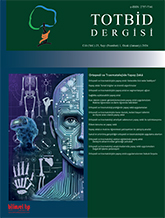
The master-apprentice relationship has been a fundamental educational method in surgical training for many years, enabling the transfer of experience to the next generation. However, in recent years, the increase in data speed, as seen in various fields, has led to incorporation of technological applications in education due to rising educational costs. Studies demonstrating the comparable success of artificial intelligence applications to that of expert doctors are supported by cost-effectiveness analyses. These applications find various uses, from aiding in diagnostic treatment planning to predicting complications and conducting simulations. Before transitioning to the pinnacle of clinical applications in Miller`s learning pyramid, simulation applications, particularly emphasizing motor skills, such as in arthroscopy and arthroplasty, allow residents to test themselves extensively. As with any new technology, enhancing the quality of orthopedic specialization education aims to overcome security, cost, and efficiency challenges. Integrating these applications into the education of emerging surgeons is necessary for their adept and active use of technologies. Familiarity with the functioning of these technologies, the ability to intervene when necessary, and the prevention of potential errors are imperative. Every new technology should still be approached with caution. It should not be forgotten that errors arising from educational shortcomings will be passed on to future generations. The primary responsibility for the development and oversight of strategies in this regard falls on professional organizations and education authorities.